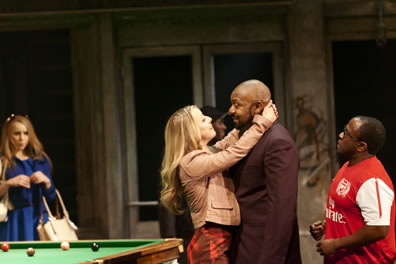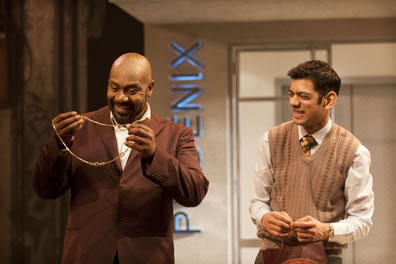The Comedy of Errors
Lenny Henry Was the Drawing Card,
But Adriana Played the Winning Hand
National Theatre (NT Live), Olivier Theatre, London
Thursday, March 1, 2012, UA Fairfax Towne Center 10 Cinema, Fairfax, Va.
Directed by Dominic Cooke

Adriana (Claudie Blakley) seduces the wrong Antipholus (of Syracus, played by Lenny Henry), as Dromio of Syracuse (Lucian Msamati) and Luciana (Michelle Terry) watch. Adriana would shed her jacket and crawl across the pool table to entice her supposed husband home to dinner. Photo by Johan Persson, National Theatre.
Call it stunt casting, if you like, but England’s most revered theater companies have a long and successful tradition of casting pop stars, TV comedians, and other nonclassically trained entertainers in Shakespeare productions. So, when the National Theatre scored Lenny Henry, one of Britain’s most popular comedians, to play Antipholus of Syracuse in The Comedy of Errors, it generated much anticipation not only in the UK but also in our home. Henry’s BBC sitcom Chef!, which aired from 1993–1996, is a favorite of ours. Thus, we re-arranged our schedules in order to take in the NT Live broadcast of the London stage production at a cinema here in Fairfax County, Va.
Henry didn’t disappoint, but he didn’t wow us, either. However, a couple of other performances brought unexpectedly special delights to Dominic Cooke’s modern London approach to the play.
The purpose of the modern London setting was that, rather than the audience feeling it was in a strange land, the characters would come across as aliens in a land where the audience felt at home. Notably, Aegeon’s family, along with the Dromios, were people of color and speaking with African-Caribbean accents, as if the native Syracusans were residents of Brixton who had wandered into London’s East End.
Ephesus had a vaguely mob-land feel to it with Duke Solinus (Ian Burfield) acting more like a mob boss with thugs as his officers than a governing authority with a police force. The mob concept in itself is a useful reading (and not a new one), but as Burfield relied on volume and fierceness in delivering most of his lines, we couldn’t sense real compassion in him at first nor utter confusion in him at the end.
One of the problems inherent in presenting this play today is how to portray its violence. This production seemed to try to find a midplace between cartoonish and reality that was meant to be funny but was at times too realistic to laugh at, especially when Antipholus of Syracuse took a pool cue to his Dromio, even poking him through the head with it. You can always count on crotch-shots to make violence funny, I guess, and this production tallied up an excess of those.
Another challenge for modern directors is what to do with Aegeon’s long expository speech at the beginning of the play. Cooke’s answer was to have Joseph Mydell’s Aegeon tell his tale while it played out around him. In an extravagant sequence relying on ever-moving sets and special effects, Aegeon took us through the scenes of a younger Aegeon and Emelia getting married, giving birth to twins, receiving the other twins, boarding the fateful ship, and becoming separated in the shipwreck, then concluding with the two sons taking their leave of Aegeon to search for their brothers. While this might have served duty for keeping the audience attuned to Aegeon’s long story and prepped us for the confusions to come, it ultimately undermined the play’s ending, for when Emelia (Pamela Nomvete) emerged from the abbey, we already knew she was Aegeon’s long-lost wife, robbing the great reveal of its most emotional punch.
The elaborate set continued transitioning throughout the play, from an alley, to a streetside café, to a pool hall, to the red-light district, to a suburban London high street, to a real ambulance for Dr. Pinch’s posse of white-coated medical techs. Designer Bunny Christie earned a “brilliant” badge especially for her presentation of the Phoenix as a modular three-story Euro-urban apartment building in blue neon trim (including the “Phoenix” down one side) with an elevator from the front gate to the upper floors. The sisters carried out their Act 2, Scene 1, dialogue on the second-floor balcony (first floor in UK speak), and Adriana and her brother-in-law Antipholus appeared on the top balcony in robes as her husband Antipholus clamored on the street underneath the balconies and the Dromios warred with words through an intercom.
The costumes, also by Christie, perfectly suited the characters and vice versa. The sisters’ thigh-high, form-fitting dresses and umpteenth-inch platform heels were fashionably sexy yet just a smidgen more modest than what the prostitutes were wearing. The tailored suits of Solinus, the Antipholi, and the merchant broadcast comfortable wealth and easy style. Emilia’s traditional African tribal dress emphasized both her otherness and her mystical presence. The two Dromios were wearing Arsenal Football Club shirts. After all, Dromio of Ephesus (Daniel Pyser) asks Adriana, “Am I so round with you as you with me, that like a football you do spurn me thus?” Then, among the many images Dromio of Syracuse (Lucian Msamati) uses to describe the officer who arrested Antipholus of Ephesus is “he that goes in the calf’s skin that was killed for the Prodigal … he that went like a bass-viol in a case of leather.” Indeed, that thug of an officer wore a leather jacket.
Henry was not merely stunt casting; he was smart casting. He is a veteran actor, and while he may not have brought much poetry to the part, he did bring his comedian’s instincts to the play. In wooing Luciana, Henry didn’t work the romantic verse; rather, he played a man who’s hot for a woman he’s never met before but she not only seems to know him well, she is apparently his sister-in-law. It’s that absurdity a comedian of Henry’s caliber can capture so well. He also maintained a genial smoothness even in the midst of his bewilderment, a notable contrast from Chris Jarman’s bully of an Ephesian Antipholus (the difference between a newcomer to Solinus’ territory and one who has served Solinus for quite some time, perhaps?). Henry also innately understood the Abbot and Costello nature of the spherical Nell routine (Luce in this production), and so turned straight man to his Dromio’s describing the countries he found in the kitchen wench’s body. The astutely paced playing of this skit earned laughs with each line.
However, two truly hilarious comic performances emerged from two unexpected portrayals. One was Amit Shah playing Angelo as a high-strung goldsmith barking in frustration every time an Antipholus seemed to foreswear himself. Angelo is, in fact, the pivotal player in the second-half confusions, and I realized watching Shah’s performance how vital it is to have such a talent in the role.

Lenny Harris as Antipholus of Syracuse admires the chain wrongly presented to him by the goldsmith, Angelo (Amit Shah), in front of the Phoenix. Shah's Angelo already was high strung even before he encounters Antipholus of Ephesus who denies ever having received the chain. Photo by Johan Persson, National Theater.
The other surprise was Adriana, a discovery in the performance of Claudie Blakley. Wronged wife? Shrill shrew? Strong-willed in talk but weak in substance? She’s the play’s most complex character, and Shakespeare gives her and Luciana, along with Aegeon, the most structured verses. As if she refused to be left out of the fun all the men were having, Blakley explored Adriana’s verses for as many laughs as she could glean, and she scored them through deliveries that relied on timing and overt attitude. For, oh, what an attitude this Adriana had. Think a young Carmela Soprano transplanted to London’s East End: the superior bearing of the mob wife enjoying an upscale life but never letting go of a personality and dialect forged from the streets and pubs of the working class-cum-yuppiefied London suburb. She was always sexy. Favoring tight red dresses, she seductively prowled after Antipholus (of Syracuse), at one point slithering across the top of a pool table and going down on her supposed (and surprised) husband as other customers excitedly watched. She was always fierce, too. From the moment she first appeared on the Phoenix balcony in debate with Luciana (Michelle Terry, in blue, and with an equally strong performance), you anticipated she might end up in an EastEnders–worthy scrap with somebody: her sister, the courtesan, even the thuggish officer. She finally did deliver a stinging slap to the face of Antipholus (of Ephesus), ostensibly for his having taken the ring from the courtesan but really on the general principle that some Antipholus needed slapping after all that had happened.
Blakley’s Adriana and Shah’s Angelo were revelations, but a key lesson of this production is owed to Henry: he played his strengths and didn’t try to do much more than that. The same could be said about producing this play. The Comedy of Errors is just that, a comedy of errors. Its strength is itself. When you layer on too many visuals and concepts to the action as written, you lose sight of the errors and lose track of the comedy.
Eric Minton
March 8, 2012
Special Note
This was our first experience with an NT Live broadcast, an alternative medium for anybody who isn’t able to get to the National Theater’s complex on London’s South Bank to see these productions in person.
I certainly prefer live theater. With the cameras often moving tight on characters, you sometimes miss the overall scope of a scene (and as it’s a live recording it doesn’t get the benefit of carefully-thought-out editing that filmed productions have; rather, it switches from camera to camera in real time like coverage of a football game). For example, when Antipholus of Ephesus was shut out of his house, the camera switched to the view of Adriana walking out onto the upper balcony in her robe, then immediately switched back down to the street level and the characters talking there. Suddenly, the audience laughed at something we couldn’t see: Antipholus of Syracuse, also wearing a robe, joining Adriana. He was doing something with a box of tissues, but when we cut back up to the balcony, we had missed the moment. Similarly, the Aegeon’s history sequence and the Dr. Pinch chase scenes were sometimes hard to follow on the cinema screen, whereas the wider perspective probably made these moments flow more smoothly for the theater audience.
This is not so much griping as an assessment of things to expect if you're new to such broadcasts. You can also expect to see a live, at-that-moment performance by some of the world’s greatest actors working for one of the world’s greatest theater companies performing some of history’s greatest plays. With its outstanding production and sound quality, NT Live is the next best thing to being there. And if you can’t be there, well, it’s the best thing, and a great thing, too.
Comment: e-mail editorial@shakespeareances.com
Start a discussion in the Bardroom


